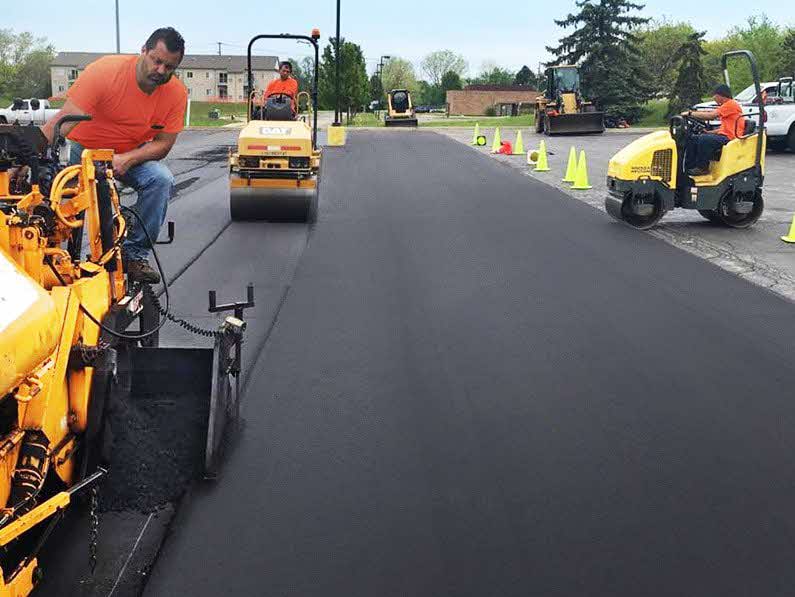Chip Sealing Macomb Michigan
We Are Locally Owned
& Operated For 36 Years
Contact Us Today!
About Chip Sealing
Understanding Chip Sealing
Chip sealing is a specialized process used in the paving industry, offering a versatile and economical option for maintaining and enhancing commercial properties. Whether you are a property manager looking for cost-effective ways to maintain your asphalt surfaces or a developer seeking aesthetic options that are both durable and affordable, chip sealing provides a solution that is truly worth considering. The unique combination of asphalt and stone offers a unique finish commonly used on driveways, roadways, and commercial parking lots.
The Process of Chip Sealing
The process of chip sealing involves various critical steps. The first step usually involves thoroughly cleaning the surface that requires treatment. Next, a layer of hot liquid asphalt is applied, which acts as a binding agent. After this, the contractors cover the asphalt with crushed stones or chips, hence the term ‘chip seal driveway’ or ‘chip and seal driveway’. A roller then compacts the surface before sealing to ensure the chips are adequately embedded into the asphalt. Cooling and setting the top layer then takes place before the area can endure any traffic.
Benefits of Chip Sealing
The benefits of chip sealing are numerous, starting with cost-effectiveness. Compared to traditional asphalt paving, chip sealing is significantly more affordable due to the use of fewer materials and the elimination of costly equipment. Furthermore, the process of chip sealing is quicker, meaning less disruption to your business operations.
Another benefit of chip sealing is its durability. The addition of the chip seal layer creates a protective shield against harmful UV rays and weather-related damage, making it perfect for use in harsh climates. Also, the rough surface texture of a chip and seal driveway provides excellent skid resistance, ensuring the safety of vehicles and pedestrians alike.
Choosing the Right Tar & Chip Driveway Contractors
While chip sealing is a relatively straightforward process, using professionals like tar & chip driveway contractors is highly recommended. The success of chip sealing lies in correctly executing each stage of the process, an area where experienced contractors excel. Experienced professionals can help you select the right type of chips for your project, ensuring the finished surface meets your aesthetic and functional requirements. Additionally, seasoned contractors understand the precise ratios of tar and chips required for a durable surface, helping to extend the longevity of your investment.
Localising Your Chip Seal Paving Project
Enlisting local contractors for your chip seal paving project is beneficial for several reasons. In addition to supporting local businesses, local contractors understand the specific climate and regional considerations that play a crucial role in the durability of chip sealing. They are also likely to be familiar with regional regulations and permitting requirements, ensuring your project is compliant.
Chip and Seal Paving for Commercial Properties
While chip and seal paving is commonly associated with driveways or residential roads, it is also an excellent choice for commercial properties. Whether it’s a restaurant’s parking lot, a school’s playground, or an office’s pathways, chip and seal provide a durable, budget-friendly, and visually attractive solution. Additionally, chip and seal paving requires minimal maintenance, an added bonus for busy facilities managers or property owners.
Conclusion
Chip sealing helps commercial property owners balance aesthetic appeal, durability, and budgets. Its versatility, combined with the mix of affordability and longevity, makes chip sealing an attractive solution for commercial paving needs. Get the most from this durable and cost-effective paving option by choosing experienced chip seal driveway contractors who can execute the process flawlessly and according to your unique requirements.
Your Next Steps
If you’re contemplating a new paving project or are concerned about the deteriorated state of your current paving, consider the benefits of chip sealing. Reach out to a local tar and chip driveway contractor to discuss your project and receive a personalized quote. Let the professionals guide you through the process and help you maximize the benefits of this unconventional but effective paving solution.
Contact Us Today for a FREE
Chip Seal Quote






About Macomb, Michigan
History
The founders of Macomb Township arrived in the early 19th century in search of flat and fertile farmland, like that near the Clinton River. Many of these early settlers were of German descent, and the German influences remain today. The Township of Macomb was officially approved by the Legislative Council on March 7, 1834.
The township was named in honor of General Alexander Macomb, who was a highly decorated veteran of the War of 1812; his successful mercantile family owned most of Macomb County at one time.
Macomb Township was a large part of the lumber and logging industry of southeast Michigan in the late 19th century and early 20th century. Logs would be transported south from Wolcott Mill in Ray Township, down the Middle Branch of the Clinton River to sawmills. Romeo Plank Road is a historic route that follows the river on its western side.
Macomb Township experienced significant growth during the period of 2000–2008, boasting a 48% increase in population.
Geography
Macomb Township is at the geographic center of Macomb County. Mount Clemens, the county seat, is 7 miles (11 km) to the south, and downtown Detroit is 26 miles (42 km) to the south-southwest.
According to the U.S. Census Bureau, the township has a total area of 36.35 square miles (94.15 km), of which 36.25 square miles (93.89 km2) are land and 0.09 square miles (0.23 km), or 0.26%, are water.
Communities
- Macomb (or Macomb Corners) is located in the northwest part of the township at 42°42′03″N 82°57′33″W / 42.70083°N 82.95917°W on Romeo Plank Road at 25 Mile Road, near the Middle Branch of the Clinton River.
- Meade is located in the northeast portion of the township at 42°43′03″N 82°52′26″W / 42.71750°N 82.87389°W on the boundary with Ray Township at 26 Mile Road and North Avenue.
- Waldenburg is located in the central portion of the township at 42°39′26″N 82°56′15″W / 42.65722°N 82.93750°W, a few miles south of Macomb on Romeo Plank Road and the Clinton River, chiefly in the 22 Mile Road area.
Demographics
| Race / Ethnicity (NH = Non-Hispanic) | Pop 2000 | Pop 2010 | Pop 2020 | % 2000 | % 2010 | % 2020 |
|---|---|---|---|---|---|---|
| White alone (NH) | 47,968 | 70,906 | 77,042 | 95.03% | 89.10% | 84.05% |
| Black or African American alone (NH) | 420 | 3,096 | 4,627 | 0.83% | 3.89% | 5.05% |
| Native American or Alaska Native alone (NH) | 88 | 136 | 99 | 0.17% | 0.17% | 0.11% |
| Asian alone (NH) | 710 | 2,446 | 3,198 | 1.41% | 3.07% | 3.49% |
| Pacific Islander alone (NH) | 4 | 15 | 19 | 0.01% | 0.02% | 0.02% |
| Other race alone (NH) | 27 | 72 | 216 | 0.05% | 0.09% | 0.24% |
| Mixed race or Multiracial (NH) | 526 | 1,106 | 3,603 | 1.04% | 1.39% | 3.93% |
| Hispanic or Latino (any race) | 735 | 1,803 | 2,859 | 1.46% | 2.27% | 3.12% |
| Total | 50,478 | 79,580 | 91,663 | 100.00% | 100.00% | 100.00% |
As of the census of 2010, there were 79,580 people and 27,585 households in the township. The population density was 2,196.8 inhabitants per square mile (848.2/km2). There were 27,585 housing units. The racial makeup of the township was 90.5% White, 3.9% African American, 0.2% Native American, 3.1% Asian, 0.0% Pacific Islander, 0.7% from other races, and 1.6% from two or more races. Hispanic or Latino of any race were 2.3% of the population.
As of the census of 2000, there were 50,478 people, 16,946 households, and 14,065 families residing in the township. The population density was 1,391.7 inhabitants per square mile (537.3/km2). There were 17,922 housing units at an average density of 494.1 per square mile (190.8/km). The racial makeup of the township was 96.12% White, 0.84% African American, 0.19% Native American, 1.41% Asian, 0.01% Pacific Islander, 0.31% from other races, and 1.12% from two or more races. Hispanic or Latino of any race were 1.46% of the population.
There were 16,946 households, out of which 45.3% had children under the age of 18 living with them, 73.7% were married couples living together, 6.5% had a female householder with no husband present, and 17.0% were non-families. 13.7% of all households were made up of individuals, and 3.9% had someone living alone who was 65 years of age or older. The average household size was 2.97 and the average family size was 3.30.
In the township the population was spread out, with 30.2% under the age of 18, 6.9% from 18 to 24, 35.1% from 25 to 44, 20.3% from 45 to 64, and 7.4% who were 65 years of age or older. The median age was 34 years. For every 100 females, there were 99.6 males. For every 100 females age 18 and over, there were 97.3 males.
Education
The public school districts that serve residents of Macomb Township are Chippewa Valley Schools, L’Anse Creuse Public Schools, New Haven Community Schools and Utica Community Schools. For public library services, the Township is served by the Clinton-Macomb Public Library district.
Contact Us Today for a FREE
Chip Seal Quote
Our Chip Seal services are available in Macomb as well as all of Macomb County.
Our dedicated team at D&J Contracting Inc is at-the-ready to provide you with great customer service and first class Chip Seal services. Reach out to us at (586) 954-0008 to discuss your Chip Seal needs today!